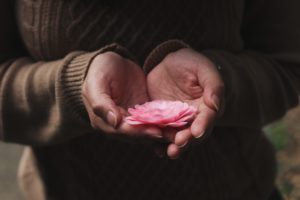This post has been simmering in the back of my mind for some while. I’ve taken my time approaching it because it seems to be something of a landmine for some people.

In simplest terms, to be grateful is to be thankful.
It’s easy to be thankful for the things we enjoy and that make us happy. Thankfulness can also be a matter of routine or ritual, as in the case of saying grace before meals, or a display of good manners, like thanking a service person.
Those are the smiling, kindly faces of gratitude.
But gratitude can also wear the aspect of a hag, and then we’re in darker, grittier territory.
Part of the experience of life and relationship includes pain and trauma, there’s no getting around it. We all have a haunted cellar in our soul in which we have suffered. Sadly, many people live in that cellar, picking their scabs, reopening their wounds, and competing with others to win the Most Victimized and Best Haunted Cellar awards.

That’s a choice.
I’m not suggesting our feelings of disillusionment, pain, rage, fear, shame, betrayal and self-pity are wrong or inappropriate, nor am I victim blaming or shaming, taking some kind of high moral ground, or minimizing the tragic challenges and traumatic experiences we face in life.
Our inevitable wounds are not the point. The point is what we choose to do with them. Do we heal them or not?
It’s important to acknowledge some people don’t want to heal. Some find the payoff for chronic bleeding too seductive to want to stop it. I don’t understand this, but I know it’s so, and I respect that choice.
We can be a motionless victim or we can practice gratitude and allow it to sweep us forward. We can’t do both.
If we do want to heal, we have to give up blame. This is a big thing to let go of, and some will choose not to. Again, that’s a choice I can understand and respect. It’s also a dead end. If we insist on holding tight to our blame, we’ve cut ourselves off from the possibility of full healing. As long as we blame others or ourselves, we’re refusing to acknowledge our own responsibility and power.
Blame and responsibility are not the same thing. When I say responsibility, I don’t mean we’re necessarily responsible for our trauma. I mean our responsibility for how we handle it, and our responsibility for our feelings. Taking responsibility for our lives is empowering. Blame leads us into an endless loop of victimhood and/or self-hatred.
We can use addiction, compulsion, and other self-destructive behaviors to numb, distract, or forget our wounds, but none of those coping mechanisms help us reclaim our power.
Healing takes time and patience. Sometimes it takes years, or even decades. There is no shortcut around our feelings. We often need support. Healing can be a messy, exhausting, ugly, extremely vulnerable business.
Healing, like relationship, is a crucible, a dark womb in which we transform our wounds into scars. Gratitude is one of the agents of that transformation, but it can’t show up until we’ve begun to actively work through our feelings.

Gratitude and forgiveness are often hand in hand. Note I did not say forgetfulness, but forgiveness. Scars are permanent reminders of our journey, but they need not be a matter of shame. We can choose to view them as medals of honor. We can choose to relate to others out of the empowerment and wisdom our scars represent rather than the wounds that caused them.
In every experience there is something to learn. We learn about ourselves. We learn about others. We learn about the way the world works. We learn about power. Learning makes us bigger, stronger, wiser, more effective, and more powerful in our lives. If what we learned is bitterness, we’re still blaming. We haven’t taken enough time, or found the right support, or finished the journey from wound to scar. Bitterness does not grow gratitude. It’s not empowering. It makes us small and shrivels our hearts.
We can’t control what other people do, but we can choose to see those who hurt us as teachers, learn the lesson, graduate, and be grateful. We can look back on the most uncomfortable experiences in our lives as the most meaningful and growthful.
Our culture encourages us to be dissatisfied with our lives as they are. We’re trained from childhood in longing and envy rather than in gratitude. The truth is if we can’t be thankful for what we have right now, this minute, we won’t be thankful for more money, a different body, a different job or house or car.
Thankfulness is acceptance of whatever our circumstances are in the now, even if they’re difficult and we need to change them. Especially if they’re difficult and we need to change them. If our lives aren’t working and we know it, we can be grateful for accepting what is (we’re miserable) and take advantage of the opportunity to learn to manage our power in such a way that we can make positive change. Misery is highly motivating.
So often we have an ideal in our heads, or a set of expectations, that keeps us reaching for more, or different. The practice of gratitude requires us to settle down and take a good long look at what we have, what we are, and where we are. What is there to learn? What can we be grateful for? Expectations are devoid of gratitude, because they don’t reflect reality.

Gratitude takes strength and courage, especially during dark times of pain, fear, and despair. It’s also one of the most powerful choices we can make. It leads us into the light. It comforts our raw feelings. It keeps us focused on joy, and the simple gifts in each day.
In seeking gratitude, we go deeper than we’ve gone before, far beyond the fact of our wounding. We reclaim our power, not over what happens to us, but how we use such events and circumstances to water and feed our best selves. To feel gratitude is to come fully into peaceful alignment with our lives, whatever they have been, whatever they are now, whatever they might be.
Thank you.
© 2020 – 2022, Jenny Rose. All rights reserved.
This was a great post! I loved every word!
Thank you, Dawn. I might have known you’d understand!